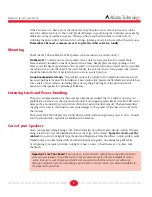
○ ○ ○ ○ ○ ○ ○ ○ ○ ○ ○ ○ ○ ○ ○ ○ ○ ○ ○ ○ ○ ○ ○ ○ ○ ○
6
○ ○ ○ ○ ○ ○ ○ ○ ○ ○ ○ ○ ○ ○ ○ ○ ○ ○ ○ ○ ○ ○ ○ ○ ○ ○
Models 451 LR, 453 C, and 454 SR
Atlantic Technology
®
The
Boundary Compensation Control
on the rear panel of the 453 C provides a unique way to
fine-tune the frequency balance of the speaker when it is placed on or near a reflective surface. In
many situations, the unfortunate audible result of placing a speaker on top of a TV is a boost in the
midrange response from the sound reflecting off of the TV
screen. This can often result in harsh midrange and treble
response and a blurring of the sound when you are sitting off
to the side.
Once you have the speaker in position, put on some music or
a movie with good center channel information. Sit down and
listen for a few minutes. If you find the midrange response
exaggerated, rotate the
boundary compensation control
counterclockwise with the switch in the
variable midrange
position. This will reduce the level of midrange frequencies.
Conversely, if there doesn’t seem to be enough midrange frequencies, if voices sound muffled for
example, rotate the boundary compensation control clockwise to increase these frequencies.
For free-air use, and to meet THX specifications, keep the switch next to the boundary compensation
control in the THX position. The variable control will have no effect when this switch is in the
THX position.
The
Model 454 SR Surround Speakers
should be placed at the sides of the room with the null
(the point of the triangle between the two sets of drivers) of the speakers aimed at the listening
position. Height of the surrounds should be between ear level and two feet above ear level. If there is
more than one row of seats, the surround speakers should be at the sides of the room at the
geometrical center of the seating positions. Some people prefer to have the surround speakers mounted
high up on the side walls, slightly behind the listening position. In this case mount the speakers
upside-down to position the tweeters at the bottom of the cabinet. This will acoustically position the
speaker lower on the wall. This mounting position can provide a larger sense of “space” and may be
the only choice in some rooms.
The
Model 452 PBM Powered Subwoofer
should be placed in the front of the room, close to a
corner. Every room has its own unique sound, and flexibility in the exact placement of the subwoofer
is always desirable. In general, the closer the woofer is placed to a corner, the more bass response you
will hear. However, in many rooms, corner placement can produce too much bass and the subwoofer
will work best well away from the corner. Experiment to find the best position in your room. Refer to
the wiring diagrams in the subwoofer’s owner’s manual for the correct wiring scheme for your
particular setup. Then proceed with listening.
Subwoofer Tuning
Start your listening with the high-pass filter set at 80Hz, the phase switch set to normal, and the
level control all the way down (counterclockwise). Play some music that you know has good bass
content, and turn the level control up until you just start to hear the subwoofer working. Now, from
your normal listening position, determine whether the subwoofer is playing loud enough and filling in
the bass frequencies of the music evenly. If it needs adjustment, change the setting of the level control
to compensate.
Figure 4:
Boundary
Compensation
Control on rear
panel of 453 C.








